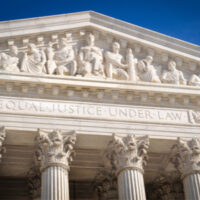U.S. Supreme Court to Hear Cases On Whether Religious Employers Are Exempt from Civil Rights Laws

The U.S. Supreme Court will soon hear two new cases involving the question of whether religious employers are exempt from certain civil rights laws; i.e. if they can engage in blatant discrimination and violate employment laws, for example, while claiming that they are protected in engaging in those activities by the First Amendment.
The Cases
Both of the cases involved Catholic schools terminating teachers for causes linked to illnesses and age discrimination by claiming that the teachers fell under the “ministerial exception,” which limits the application of federal and state laws barring employers from discriminating on the basis of age, disability, race, color, sex, national origin, and other factors. The religious employers specifically argue that they are exempt because the First Amendment prohibits any government – state or federal – from getting involved with a religious organization’s internal affairs because that would mix church and state, and religious clauses in the constitution guarantee free exercise while mandating separation of church and state.
Precedent
The Court’s history on the subject is as follows: It has previously held that where a teacher “reflects a role in conveying the Church’s message and carrying out its mission,” they are a “commissioned minister” and are thus barred from suing the school; even if they are terminated for discriminatory reasons. However, the Court did not go into detail as to how to determine whether employees are “ministerial.” Lower courts have attempted to apply their own tests, for example, relying on a “totality of the circumstances” test to determine whether an employee is “ministerial.”
If that test is applied in the current cases, the Court will likely be hard-pressed to consider these teachers “ministerial,” as neither of them has a religious background or training, although at least one did teach a religious curriculum that “incorporated Catholic values” and lead the students in daily prayer for thirty minutes per day, four days per week.
The Consequences of the Decision
The Court’s decision will have broad implications and, if it rules in favor of the religious employers, could open the door for such employers to essentially discriminate against anyone by claiming some connection to the entity’s spiritual mission or providing them with some nominally faith-based task. There is no question that this would have dire consequences for those most frequently discriminated against, including racial minorities, the disabled, women, the LGBTQ community, etc.
There is also no question that it could have a chilling effect in terms of fear of retaliation; not just when it comes to discriminatory conduct; but all forms of inappropriate conduct, including harassment and legal violations.
Contact Our Florida Civil Rights Attorneys
If your civil rights have been trampled upon, the Orlando civil rights lawyers at the Baez Law Firm will work to ensure that you are aggressively defended and compensated for any harm done to you. Contact us today to find out more.
Resource:
slate.com/news-and-politics/2019/12/supreme-court-religious-employers-discrimination.html
https://www.baezlawfirm.com/u-s-supreme-court-denies-adnan-syeds-appeal/
